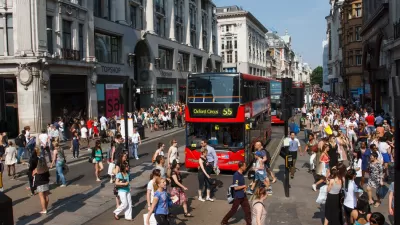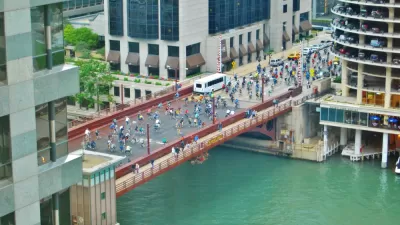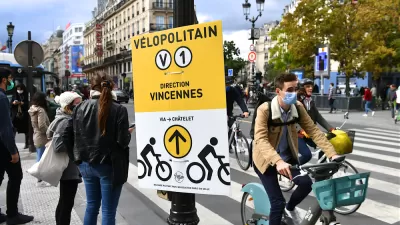As local councils debate making permanent changes implemented last year, can pedestrian and cycling advocates hold on to their victories?

Since the start of the pandemic, writes Niamh McIntyre for The Guardian, England's roads have been the testing grounds for a "grand experiment" that has led to a bitter standoff between pedestrian advocates and motorists. As part of mayor Sadiq Khan's Streetspace plan, implemented last year as an "urgent and swift response" to the pandemic and London's broader need to reduce congestion and pollution, "funnelled money from the government’s new active-travel fund to London’s boroughs for low-traffic neighbourhoods (LTNs) and other projects to encourage walking and cycling, such as temporary cycle lanes and timed road closures outside schools."
Since almost half of London car trips are under two miles, "the theory is that by reducing the amount of road space for cars, people will find other ways to make short journeys." Opponents argue that not everyone can easily take alternate routes, and that the measures only increase traffic and congestion on other streets—an assertion not borne out by evidence: "early monitoring of new LTNs in Hackney and Lambeth found that traffic on main roads hardly increased at all," and "data from established LTNs in Walthamstow showed the opposite."
While early "enthusiasm for LTNs brought about a rare consensus between the Conservative government and the Labour mayor of London, as well as Greens and pro-cycling groups," the backlash as traffic returns to London streets has been severe. In addition to DIY removal of LTN infrastructure, "opponents of the mayor’s walking and cycling plans have pursued numerous legal challenges to the new policies."
The future of LTN and other programs started during the pandemic will hinge on the next few months "as councils push for temporary schemes to become permanent, and objectors fight for the right to drive wherever they need to go."
FULL STORY: Traffic wars: who will win the battle for city streets?

Planetizen Federal Action Tracker
A weekly monitor of how Trump’s orders and actions are impacting planners and planning in America.

Maui's Vacation Rental Debate Turns Ugly
Verbal attacks, misinformation campaigns and fistfights plague a high-stakes debate to convert thousands of vacation rentals into long-term housing.

San Francisco Suspends Traffic Calming Amidst Record Deaths
Citing “a challenging fiscal landscape,” the city will cease the program on the heels of 42 traffic deaths, including 24 pedestrians.

Defunct Pittsburgh Power Plant to Become Residential Tower
A decommissioned steam heat plant will be redeveloped into almost 100 affordable housing units.

Trump Prompts Restructuring of Transportation Research Board in “Unprecedented Overreach”
The TRB has eliminated more than half of its committees including those focused on climate, equity, and cities.

Amtrak Rolls Out New Orleans to Alabama “Mardi Gras” Train
The new service will operate morning and evening departures between Mobile and New Orleans.
Urban Design for Planners 1: Software Tools
This six-course series explores essential urban design concepts using open source software and equips planners with the tools they need to participate fully in the urban design process.
Planning for Universal Design
Learn the tools for implementing Universal Design in planning regulations.
Heyer Gruel & Associates PA
JM Goldson LLC
Custer County Colorado
City of Camden Redevelopment Agency
City of Astoria
Transportation Research & Education Center (TREC) at Portland State University
Jefferson Parish Government
Camden Redevelopment Agency
City of Claremont





























